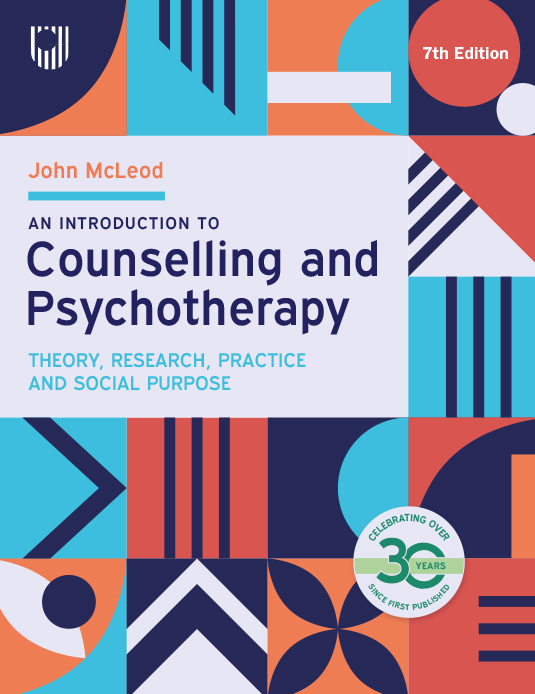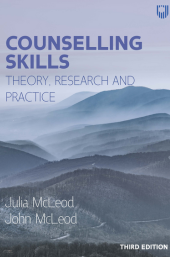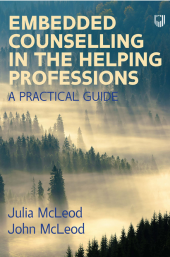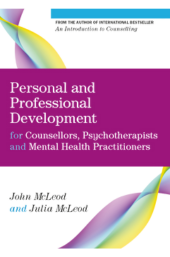Counselling and Psychotherapy continue to evolve in response to the complex challenges of modern life. Students and practitioners today are called to engage with diverse client experiences, new theoretical perspectives, and changing social contexts – from issues of social justice and climate anxiety to trauma, loss, and wellbeing across communities.
The McLeod Collection is your trusted companion for a fulfilling, reflective, and evidence-informed counselling journey.
An Introduction to Counselling and Psychotherapy: Theory, Research, Practice and Social Purpose, 7th Edition
John McLeod’s accessible bestseller provides a comprehensive, research-informed overview of the theory and practice of counselling and psychotherapy. Now in its seventh edition, this leading introduction to the discipline has been expanded to include a renewed focus on social justice, the use of technology in therapy, non-Western traditions, socio-political and decolonising perspectives, and working with clients who are considering taking their own lives.
The book retains its comprehensive coverage of both mainstream and emerging approaches to therapy, and professional issues such as supervision, training, therapist development, ethical standards, and research-informed practice. New to this edition is wider coverage of issues such as racism, the climate crisis, gender, and sexuality; debates around neuroscience, spirituality and integrative approaches to therapy; and third-wave transdiagnostic cognitive behavioural therapies such as ACT, mindfulness, and FAP.
This book equips readers with the confidence to navigate and apply a range of therapeutic models. Building on the author’s significant research and professional experience, the 7th edition of An Introduction to Counselling and Psychotherapy remains the definitive guide for students and practitioners.
Counselling Skills: Theory, Research and Practice, 3rd Edition
Counselling Skills: Theory, Research and Practice provides comprehensive coverage of all aspects of the development of interpersonal helping skills used by counsellors, psychotherapists, life coaches, mental health workers, and practitioners in allied fields of practice.
Distinctive features of its approach to this topic include:
- Attention to the cultural and historical aspects of counselling skills
- Tailored support for evidence-based practice
- Grounding in training models such as self-practice and deliberate practice
This new edition contains a wide range of learning tasks and reflection points to enable readers to work individually or with learning partners to deepen self-awareness, theoretical understanding, and practical skills.
Embedded Counselling in the Helping Professions: A Practical Guide, 1st Edition
Embedded Counselling in the Helping Professions offers a practical framework for understanding how frontline human service practitioners can respond effectively to the emotional support needs of those around them, by incorporating counselling skills and knowledge into their everyday professional work.
Taking a broad, interdisciplinary perspective, McLeod and McLeod provide comprehensive coverage of key areas of practice that can lead to improved outcomes for service users, including:
- Capitalising on how embedded counselling complements and builds on other interventions and forms of support
- Developing skills and activities for facilitating helpful counselling episodes that enable clients to move forward in their lives
- Using evidence from research studies to enhance practice
- Designing caring services that promote positive practitioner values and attributes, and take account of organisational challenges and opportunities
- Ongoing personal reflection, supervision and consultation to consolidate learning and awareness.
Personal and Professional Development for Counsellors, Psychotherapists and Mental Health Practitioners, 1st Edition
This book provides a comprehensive, accessible and research-informed approach to personal development issues associated with the role of a counsellor, therapist or mental health practitioner. Written by leading authors in the field, the book is designed to help both trainees and experienced therapists to be more effective in their work with clients by:
- Deepening and consolidating their understanding of all aspects of personal and professional development
- Making use of their personal strengths, resources and life experience
- Drawing on colleagues, mentors and the wider professional community as sources of learning, support and inspiration.
The first part of the book explains the nature of the personal and professional development issues that are experienced by therapists. The second part provides a set of learning tasks that invite reflection on all aspects of therapist development.
Praise for the series
View our webinar: Talking with Dementia, Reconsidered: A Journey of Collaboration and Innovation in Dementia Care
Discover:
- Behind-the-scenes insights: Learn about the collaborative process that led to the creation of this landmark resource in the field of Dementia context of the Reconsidering Dementia Series.
- Expert perspectives: Hear from Dr. Keith Oliver, a leading advocate for dementia living with the condition, and Reinhard Gus, a renowned clinical psychologist.
- Firsthand accounts: Gain insights from individuals living with dementia.
- Best practices: Discover practical strategies for improving dementia care.
- This webinar offers a unique opportunity to learn from experts and gain a deeper understanding of dementia care.
Interested in using these titles?
If you are interested in using these titles on your course, contact our Marketing team at:




